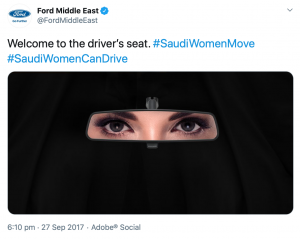
Advertising in the Middle East: a closer look at Saudi Arabia
16th Oct 2017
All markets have their own challenges when it comes to advertising and marketing. Some will be regulatory, others religious, cultural or even linguistic. But international brands need to toe the line very carefully in order to pass successfully through strict checks when advertising in the Middle East. Creative Culture takes a look at a series of adverts that succeeded in the Saudi market, and why.
Welcome to the driver’s seat
Following the royal decree that Saudi women can now drive, the advertising world saw an abundance of adverts targeting their new female audience. One such advert was posted on social media by Ford. While the lift on the ban certainly gives women a new sense of freedom, Ford was careful to highlight this in a way that was still respectful of the culture. Instead of showing the woman’s face, the image focuses only on the eyes, with the blacked out background creating the illusion of a woman wearing a niqab. And Ford wasn’t the only one to use this type of illusion – Cadillac achieved the same effect using the car window.


#TheLoveStory
In early 2017, Italian chocolate brand Raffaello launched an advert in the Middle East that played by the rules. Sticking to Saudi Arabian traditions and cultural norms, they made sure that they got the message right. Playing into cultural expectations, the advert is filled with group shots centred around drinking tea, which is a very important custom in Middle Eastern culture. And although the woman is the one pursuing the man, it’s done in a way that is considered acceptable in Saudi culture, as everything is carried out in the traditional order. The love story develops from the innocent passing of notes. There is no form of physical contact between the two lovebirds until they are a married couple, and even then, the public display of affection stops at holding hands.
Iftar table
To celebrate Ramadan, American pizza brand Domino’s launched an advert in July 2017 that went deeper than selling pizza – it was about bringing people together to discuss stereotypes and encourage collectivism. As the brand describes, the aim of the campaign was “to encourage communication and interaction between them… [enabling them to discover that] the only way to judge someone is by actually knowing him and communicating personally with each other.” This advert echoes the Heineken #OpenYourWorld campaign, but Domino’s focuses on issues specific to the Middle Eastern community. It is also interesting to note that no women are featured in this advert.
Celebrate the breakers
For their 2016 campaign, KitKat AMEA took a very innovative approach. The campaign targeted young men and women who, as the result of a “socially reserved culture”, were looking for ways to express their individualism, and enjoy their own unique breaks. In order to generate buzz, they chose to introduce the term “breakers” unbranded. This was particularly difficult because there is no Arabic equivalent for “breakers”. By using social media, celebrity endorsement, competitions and a partnership with Saudi Arabian Sa7i YouTube channel, they managed to pull off a successful campaign.
What will they say about you?
In their February 2017 advert, Nike caused quite a stir in the Middle East with their female-empowerment campaign. Released online, the advert aimed at breaking stereotypes and barriers and showed women running, skateboarding and boxing. The campaign went viral, but received mixed reviews for its controversial message. In Saudi Arabia, for example, female physical fitness is considered un-Islamic, with women’s gyms being deemed illegal. Nike seemed to play into this as the voice over at the beginning of the advert, which asks, “What will they say about you? Maybe they’ll say you exceeded all expectations” is spoken in Saudi Dialect. Some perceived it to be an utter failure, while others saw it as a triumph. Either way, it has gained credit as trying to break stereotypes and barriers and it certainly got the Arab world talking.
Whether safe or controversial, these adverts prove that knowing the target culture – what they expect, what makes them tick, and what opportunities exist in the market – will only strengthen your approach. By highlighting these elements in their campaigns, brands instantly begin to speak to consumers on a local level, allowing them to truly resonate with their audiences.
By Carly Coulter
Always be in the know.
Sign up to our weekly insights and maximise your competitive advantage



